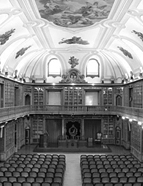

Serial history, as noted by F. Dosse, interpreting Foucault, «defines its object by constructing homogeneous series of documents, thus leading the historian to bring to light events that could not appear without him» (Renaissance de l'événement, 2010, p. 147).
The aforementioned activity of the 1940s geared towards Economic History in Coimbra contributed to overriding «the absence of a criterion of choice, and therefore of any problem, in the elaboration of what counts as a "fact" in history. » (Ricoeur, ibidem), helping to raise internal barriers by the late 1950s, a necessary period for reforms fostered by some intellectual freedom, an escape valve from the regime, and also the time of Portugal's accession to the EFTA (1960), promoting exports and the internationalisation of culture. This period in France corresponded to that of the second generation of the Annales, which imposed economic and social history in an internal context of the country's reconstruction from the end of the Second World War, beyond the international situation, while also being concerned «with the relations between ideology and the economy», as synthesised by Marie-Paul Caire-Jabinet (L'histoire en France, 2002, p. 168). The «golden age of economic and social history in France» (ibidem) effectively occurred in the 1950s and 1960s, which was naturally reflected in Portugal, although even in 1965, the official doctrine as far as the Theory of History was concerned was that of the cult of singular facts. Those who argued that History is constructed with ideas and not facts «only pursued the major political-economic-cultural lines of the evolution of peoples and civilizations». Without an «objective, documented, meticulous analysis of the singular facts, of transfinite essence, irreducible to the abstract definition of ideas, there is no History as an understanding of a past existence, but rather an Ideology as the mental recreation of a possible past which also possibly never existed» (Miranda Barbosa, «Doutoramentos solemnes» [« PhD ceremonies»], Biblos, 41, 1965, pp. 378-379).
Notwithstanding this position taken in the Sala dos Capelos, perhaps in a critical and friendly manner towards the work of the academic who was awaiting the award of a doctoral degree, there were already those in the field treading other paths which all shifted in different directions with the whirlwind of April 1974. Economic and Social History reached its peak in the curriculum between the revolution and the late 1970s, before post-modernism imposed itself and universalism gave way to daily life and micro-history- before the rebirth of the event, the history of differences, which are also national, as the generation of 1910 had invented.
